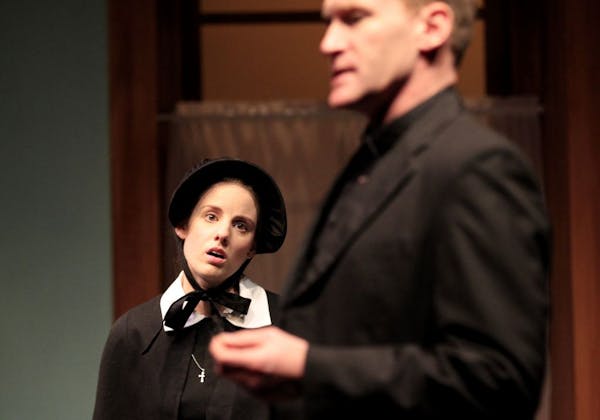The common question among patrons shuffling to the lobby is: "Do you think he did it?"
What is it about American socialization that demands we determine guilt or innocence (and in this case, without the screeching bulldog Nancy Grace as our guide -- oh, the horror)?
In John Patrick Shanley's "Doubt, A Parable," a priest's culpability with a young boy is sometimes regarded as a criminal case demanding solution. But "Doubt" is an amazingly sharp metaphorical instrument that cuts deeply into the ambiguity of real life. Each viewing reveals more about our own layers of uncertainty. "Life is beyond interpretation," as the play says.
So ends today's sermon.
Park Square Theatre opened a new production of "Doubt" on Friday, the second excellent local staging in 18 months. Ten Thousand Things used searing performances by Sally Wingert and Kris Nelson as Sister Aloysius and Father Flynn in February 2011. Craig Johnson has tapped Linda Kelsey and David Mann for those roles at Park Square.
Johnson also cast Anna Sundberg as Sister James, the idealistic teacher whose optimism is torn asunder. Regina Marie Williams plays the same role she did for Ten Thousand Things -- mother of a boy who may or may not have been abused by Father Flynn.
Sundberg's James, her face wincing with each new detail and revelation, takes the greatest journey here, and her experience forces us to contemplate how innocence can evaporate in the heat of experience.
Williams, in one economical scene, embodies the compromises real people make to fashion an everyday life. Is her son different? Did Father Flynn take advantage of him? It doesn't matter to her; Father Flynn was her son's only friend.
Certainly though, "Doubt" revolves around the death dance between Sister Aloysius, principal of St. Nicholas School, and Father Flynn, the parish priest. She despises his modernity, tolerance and friendliness toward students.
Kelsey manages both a brittle rigidity in Aloysius' convictions and a fierce, tensile strength of emotion. Belief is all she has, yet she knows deep within that dogma has not protected her from tragedy. Her acceptance at play's end of her own doubt lands with devastating effect.
Mann's Flynn, struggling against unproven accusations and his own history, eschews his easygoing charm to fight Aloysius on her terms. This is folly, and the moment when he realizes his mistake could be etched with greater impact by Mann. He does, though, eventually find Father Flynn's exhaustion.
One significant nit: an overly ambitious sound design introduces the production with a montage of news clips from 1963 and 1964 (the play's period) and then separates each scene with too-loud music that is church-y but not particular to this piece. "Doubt" is a lean and subtle meditation that requires little adornment. Its power is unmistakable.
Graydon Royce 612-673-7299

Minnesota Sports Hall of Fame: A class-by-class list of all members

This retired journalist changed professional wrestling from Mankato

